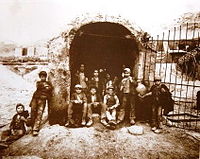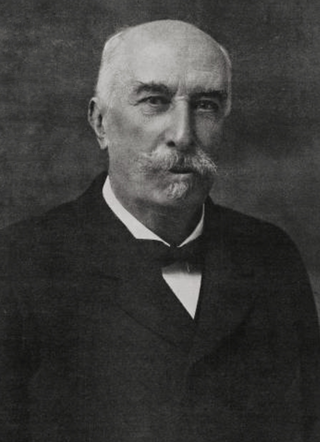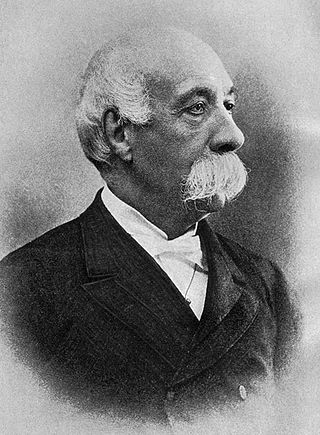| |||||
| Decades: | |||||
|---|---|---|---|---|---|
| See also: | |||||
Events from the year 1893 in Italy.
| |||||
| Decades: | |||||
|---|---|---|---|---|---|
| See also: | |||||
Events from the year 1893 in Italy.
The year is characterized by the Banca Romana scandal, discrediting the whole political system, and increasing violence in Sicily as a result of the Fasci Siciliani (Sicilian Leagues), a popular movement of democratic and socialist inspiration in 1891–1894.






Giovanni Giolitti was an Italian statesman. He was the prime minister of Italy five times between 1892 and 1921. He is the longest-serving democratically elected prime minister in Italian history, and the second-longest serving overall after Benito Mussolini. A prominent leader of the Historical Left and the Liberal Union, he is widely considered one of the most wealthy, powerful and important politicians in Italian history; due to his dominant position in Italian politics, Giolitti was accused by critics of being an authoritarian leader and a parliamentary dictator.

Francesco Crispi was an Italian patriot and statesman. He was among the main protagonists of the Risorgimento, a close friend and supporter of Giuseppe Mazzini and Giuseppe Garibaldi, and one of the architects of Italian unification in 1860. Crispi served as Prime Minister of Italy for six years, from 1887 to 1891, and again from 1893 to 1896, and was the first prime minister from Southern Italy. Crispi was internationally famous and often mentioned along with world statesmen such as Otto von Bismarck, William Ewart Gladstone, and Lord Salisbury.

The Fasci Siciliani, short for Fasci Siciliani dei Lavoratori, were a popular movement of democratic and socialist inspiration that arose in Sicily in the years between 1889 and 1894. The Fasci gained the support of the poorest and most exploited classes of the island by channeling their frustration and discontent into a coherent programme based on the establishment of new rights. Consisting of a jumble of traditionalist sentiment, religiosity, and socialist consciousness, the movement reached its apex in the summer of 1893, when new conditions were presented to the landowners and mine owners of Sicily concerning the renewal of sharecropping and rental contracts.

Rosario Garibaldi Bosco was an Italian Republican-inspired socialist, politician and writer from Sicily. He was one of the leaders of the Fasci Siciliani, a popular movement of democratic and socialist inspiration in 1891-1894.

Giuseppe De Felice Giuffrida was an Italian socialist politician and journalist from Sicily. He is considered to be one of the founders of the Fasci Siciliani a popular movement of democratic and socialist inspiration. As the first socialist mayor of Catania in Sicily, from 1902 until 1914, he became the protagonist of a kind of municipal socialism.

Nicola Barbato was a Sicilian medical doctor, socialist, and politician. He was one of the national leaders of the Fasci Siciliani dei Lavoratori a popular movement of democratic and socialist inspiration in 1891–1894, and perhaps might have been the ablest among them according to the Marxist historian Eric Hobsbawm.

Napoleone Colajanni was an Italian writer, journalist, criminologist, socialist, and politician. In the 1880s, he abandoned republicanism for socialism, and became Italy's leading theoretical writer on the issue for a time. He has been called the father of Sicilian socialism. Due to the Italian Socialist Party's discourse of Marxist class struggle, he reverted in 1894 to his original republicanism and joined the Italian Republican Party. Colajanni was an ardent critic of the Lombrosian school in criminology. In 1890, he was elected in the national Chamber of Deputies and was re-elected in all subsequent parliaments until his death in September 1921.

The Banca Romana scandal surfaced in January 1893 in Italy over the bankruptcy of the Banca Romana, one of the six national banks authorised at the time to issue currency. The scandal was the first of many Italian corruption scandals, and discredited both ministers and parliamentarians, in particular those of the Historical Left and was comparable to the Panama Canal Scandal that was shaking France at the time, threatening the constitutional order. The crisis prompted a new banking law, tarnished the prestige of the Prime Ministers Francesco Crispi and Giovanni Giolitti and prompted the collapse of the latter's government in November 1893. The scandal led also to the creation of one central bank, the Bank of Italy.
General elections were held in Italy on 6 November 1892, with a second round of voting on 13 November. The "ministerial" left-wing bloc emerged as the largest in Parliament, winning 323 of the 508 seats. The electoral system reverted to the pre-1882 method of using single-member constituencies with second round run-offs.
General elections were held in Italy on 26 May 1895, with a second round of voting on 2 June. The "ministerial" left-wing bloc remained the largest in Parliament, winning 334 of the 508 seats.
General elections were held in Italy on 21 March 1897, with a second round of voting on 28 March. The "Ministerial" left-wing bloc, led by Giovanni Giolitti remained the largest in Parliament, winning 327 of the 508 seats.
Events from the year 1892 in Italy.
Events from the year 1894 in Italy.
Events from the year 1895 in Italy.

Nicola Petrina was an Italian socialist and politician from Sicily. He was one of the national leaders of the Fasci Siciliani a popular movement of democratic and socialist inspiration from 1891 to 1894.
The Left group, later called Historical Left by historians to distinguish it from the left-wing groups of the 20th century, was a liberal and reformist parliamentary group in Italy during the second half of the 19th century. The members of the Left were also known as Democrats or Ministerials. The Left was the dominant political group in the Kingdom of Italy from the 1870s until its dissolution in the early 1910s.

Bernardino Grimaldi was an Italian politician. He was a Minister in several governments.
Events from the year 1901 in Italy.

Giovanni Noè was an Italian lawyer, anarchist and politician, involved in the Fasci Siciliani, a popular movement of democratic and socialist inspiration in 1891–1894. He was elected in Italian Chamber of Deputies in 1900 and 1904.

Vincenzo Calenda, baron of Tavani was an judge in the Kingdom of the Two Sicilies and the Kingdom of Italy. He was also a senator of the Kingdom of Italy and Minister of Justice in the third and fourth Crispi governments.